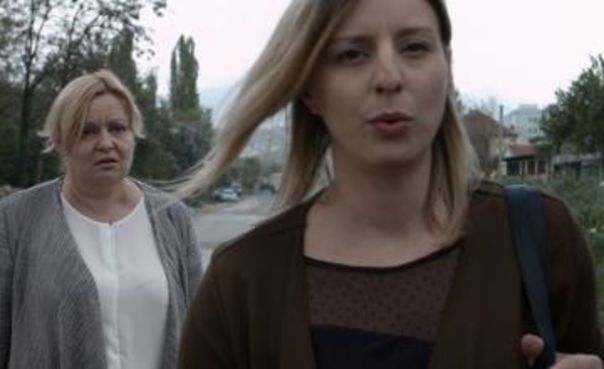Review: PLAN A
By Mina Stanikić

Competing for the Heart of Sarajevo in the Shorts selection, PLAN A (2016) is a directing debut for the Croatian Tomislav Luetić, who has appeared so far in other shorts that have circulated regional and international festivals as an actor, co-director, or co-producer. Having directed and written PLAN A, as well a music composer for the film, Luetić brings up what is apparently a personal story. He dedicates the film to a certain woman called Maja, and one of two main characters shares his surname, therefore the assumption of this being a personal story seems possible.
The film follows two women working in an architectural bureau: older employee Simona Luetić (Ksenija Marinković) and her new, younger boss (Jadranka Đokić). Basically, the only thing that happens in the film is the older one gets fired, which the viewers can foresee as her boss suggests Simona should stay after the meeting. What remains unexpected, though, is Simona’s aggressive reaction to the news that provokes the boss to threaten her by saying “Don’t make me get to the plan B”.
This film apparently intends to deal with the younger colleagues overtaking the olders' positions with disrespect, while showing the old as the victim and young as offender. However, it does not give anything more than that. If the intention was to show a universal story from the life of any aging professional, it should have at least showed us Simona’s tragic leave from the bureau, or her victory over the boss, or whatever that would actually reach the culmination point and leave a striking impression. The film ends without visualizing any consequences of what happened, not channelling any message or emotion for the viewer, and it rather seems as only the first scene of a story way longer.
Nevertheless, the actresses’ performances seem convincing, as if both of them managed to make the most out of the very little they got from the script. Numerous close-ups of their faces add to the feeling of immediacy and might provoke some empathy for Simona. Still, the general lack of her character's development leaves us no possibility of actual attachment to her, and therefore makes it hard for any empathy to appear. As a matter of fact, the intro and the end-credits are more influential on the viewer with their minimalistic, visually appealing energy in tune with the subject of architecture – with the camera virtually going in and out of the office.
With all this being said, the whole film might be one out of many scenes from the office life, and therefore this one scene should be considered enough. But since there is not much to take out of it, this film remains only a tribute to, I suppose, someone who got fired. Had the boss carried out a plan B, we might have been shown something worth seeing.

